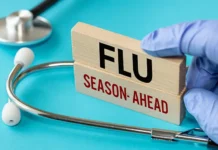
By Sandee LaMotte, CNN
(CNN) — It’s an unfounded message experts say is repeated again and again: Having an abortion may damage a woman’s mental health, perhaps for years.
“There’s so much misinformation, so many myths about abortion. Abortion will lead to substance abuse, depression, suicidal thoughts; abortion is bad for your health; every woman is going to regret it,” said social psychologist Brenda Major, a distinguished professor emeritus in the department of psychological and brain sciences at the University of California, Santa Barbara.
In reality, decades of research has shown “the vast majority of women feel they made the right choice, and they don’t experience regret,” said Major, who led a 2008 American Psychological Association task force exploring the science on abortion and mental health.
Women who had an abortion in the first trimester were no more likely to have mental health problems than women who continued with an unplanned pregnancy, the APA review concluded.
A large, long-term study, called The Turnaway Study, followed the mental health of nearly 1,000 women in 21 states who wanted and received an abortion and women who wanted but were denied an abortion between 2008 and 2010.
The women were interviewed every six months over the next five years. At the end of that time, 99% of the women who had an abortion believed they had made the right decision — in fact relief was the prominent emotion, one analysis noted.
Women who received an abortion had similar or lower levels of depression and anxiety than women denied an abortion and were no more likely to experience post-traumatic stress than women who carried their baby to term, according to study results.
The research also found no difference in mental health outcomes between a first trimester abortion and having an abortion later in the pregnancy.
Sources of misinformation
Abortion misinformation might come from friends or family, an article or study read online, or during a mandated pre-abortion counseling session some states put into place during the Roe v. Wade era, experts told CNN.
Of the 33 states that have required patients receive counseling before an abortion, eight routinely included the potential for negative psychological responses as part of the conversation, according to the Guttmacher Institute, a nonprofit research and policy organization that focuses on sexual and reproductive rights worldwide.
“There were states in which women were told that because they’re having an abortion, they’re at increased risk for depression, suicidal ideation, post traumatic stress disorder and more,” said Julia Steinberg, an associate professor of family science at the University of Maryland’s School of Public Health.
“Abortion does not cause depression, it does not cause suicide (or) suicidal ideation. It does not cause substance use. It does not cause anxiety disorders,” said Steinberg, who has studied the mental health impact of abortion for years.
In fact, the best predictor of not faring well after an abortion was a “prior history of mental health issues,” Major said. “The best predictor of substance use after an abortion was if you were already a substance abuser, and the best predictor of depression after abortion was if you’ve been depressed before you had one.”
Abortion misinformation also comes from published studies in academic journals that conclude abortion does cause mental health problems, experts say.
“The studies make it look like there is a debate, but what’s really going on is those studies are very poorly conducted,” Steinberg said. “They are not methodologically rigorous, and they don’t adhere to scientific principles.”
The 2008 APA task force published a scathing rebuke of the research quality of many studies which found mental health concerns after abortion. Studies often failed to control for factors such as rape, sexual or partner violence, or a woman’s history of prior mental disorders or substance abuse.
“We reviewed every legitimate study that had ever been done on this topic,” Major said. “The methodological flaws in so many of the studies that are being cited as showing harm to women’s mental health as a result of having an abortion were just egregious.”
A later 2018 National Academies of Sciences, Engineering and Medicine review analyzed studies on abortion’s impact on future fertility and pregnancy outcomes, risk of breast cancer, mental health disorders, and premature death.
“Much of the published literature on these topics fails to meet scientific standards for rigorous, unbiased research,” the report stated, concluding that “having an abortion does not increase a woman’s risk of secondary infertility, pregnancy-related hypertensive disorders, abnormal placentation (after a D&E abortion), preterm birth, breast cancer, or mental health disorders (depression, anxiety, and PTSD).”
Yet this belief that abortion harms women’s mental and physical health has been used to justify “waiting period laws, two-trip requirements (in which women have to come back twice) and telling women inaccurate information around medication abortion,” Steinberg said.
Being denied an abortion
A 2020 study looked at the short- and long-term impact of being denied an abortion. Results showed women who were turned away were more likely to experience significant anxiety and stress.
“In my research what we found is that the challenges of getting an abortion — finding a place, traveling, having to disclose your abortion to someone you would have preferred not to — increased symptoms of depression, anxiety and stress,” said study author Antonia Biggs, a social psychologist who is also one of the Turnaway researchers from the Advancing New Standards in Reproductive Health (ANSIRH) project at the University of California, San Francisco.
“And then at the time of being denied an abortion, those symptoms go even higher. And then over time, they do dissipate,” said Biggs, an associate professor at UCSF.
In the Turnaway study, women denied an abortion who carried their babies to term were “much more likely to experience physical health issues at the time of childbirth, as childbirth is much more risky than having an abortion,” Biggs said. Two of the women in the study died during childbirth.
A 2012 study found the risk of death associated with childbirth is approximately 14 times higher than the risk from abortion.
After five years, the study found women denied an abortion were more likely to “live in poverty and much more likely to suffer economic hardship, including more bankruptcies, debt and challenges meeting basic living needs,” Biggs said.
Women who were turned away were also more likely to be tethered to a violent and abusive partner, and to have chronic health conditions, Biggs said. “They also lowered their aspirations (for the future), and they were less likely to achieve them,” she added.
If a woman denied an abortion had existing children under 5, those children were less likely to meet their developmental milestones, more likely to live in poverty, and less likely to have bonded with their mother, the study found.
Will these outcomes affect more women now that Roe v. Wade has been overturned?
“I’m completely overwhelmed with worry,” Biggs said. “I worry about people being able to get wanted care. Some will have to overcome huge amounts of obstacles in order to access care.
“Others will hopefully safely self-manage their abortions by accessing medication abortion pills online, which we know is quite safe,” Biggs said. Before the Supreme Court reversal, over half of all abortions in the US were done via a two-drug prescription medication method, according to the Guttmacher Institute.
“Then there are some women whom I worry will use other less safe methods to self-manage the pregnancies or carry to term in a situation that they they deem is not ideal for them,” Biggs said.
Correction: A previous version of this story attributed findings to the Turnaway Study that were from a different study by Antonia Biggs.
The-CNN-Wire
™ & © 2022 Cable News Network, Inc., a WarnerMedia Company. All rights reserved.















